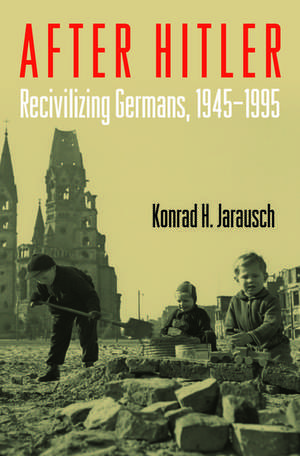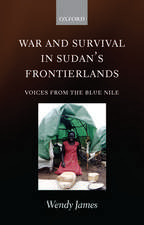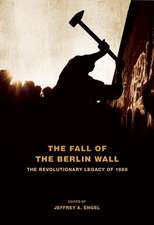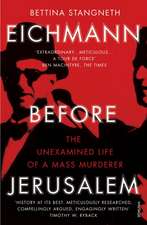After Hitler: Recivilizing Germans, 1945-1995
Autor Konrad H. Jarauschen Limba Engleză Paperback – 22 ian 2009
| Toate formatele și edițiile | Preț | Express |
|---|---|---|
| Paperback (1) | 225.90 lei 31-37 zile | |
| Oxford University Press – 22 ian 2009 | 225.90 lei 31-37 zile | |
| Hardback (1) | 821.06 lei 31-37 zile | |
| Oxford University Press – 21 sep 2006 | 821.06 lei 31-37 zile |
Preț: 225.90 lei
Nou
Puncte Express: 339
Preț estimativ în valută:
43.23€ • 45.34$ • 35.98£
43.23€ • 45.34$ • 35.98£
Carte tipărită la comandă
Livrare economică 21-27 martie
Preluare comenzi: 021 569.72.76
Specificații
ISBN-13: 9780195374001
ISBN-10: 0195374002
Pagini: 400
Dimensiuni: 226 x 152 x 28 mm
Greutate: 0.57 kg
Editura: Oxford University Press
Colecția OUP USA
Locul publicării:New York, United States
ISBN-10: 0195374002
Pagini: 400
Dimensiuni: 226 x 152 x 28 mm
Greutate: 0.57 kg
Editura: Oxford University Press
Colecția OUP USA
Locul publicării:New York, United States
Recenzii
After Hitler is a detailed and comprehensive study of foreign and domestic efforts to "recivilize" Germany following World War II.
...impressive book...Jarausch writes in a lively, engaging fashion, and this book will surely reach a broad audience extending well beyond academic specialists. Its clearly laid-out narrative will also be of enormous use to anyone seeking to find an organisational framework for a course on Germany since 1945.
[an] impressive and wide-ranging [book]... allows many fresh and original insights [and] it will undoubtedly inspire new research
A work of seasoned learning, judicious intelligence, and wide empirical range, After Hitler tells the complex and uneven story of a ruined society's long-term moral and political reconstruction. Holding in view the attainment of a 'civilized society' as a workable ideal, Konrad Jarausch surveys Germany's divided histories between 1945 and the present to draw a careful and persuasive balance. Even in the most catastrophically damaged society, he shows us, certain basic values of democratic political culture may be painfully reclaimed.
What an extraordinary challenge! Konrad Jarausch asks us to think of postwar German history - of West and East Germany in tandem - as a 'civilizing process,' as the lengthy and contorted effort of learning to live in empathy, where enmity had reigned supreme and a literally murderous war had destroyed the foundations of civility. Needless to say, this endeavor was not self-evident nor was it unequivocally chosen or, for that matter, plainly successful. How would you measure success in any case? Jarausch brings postwar history alive with these and similar questions. But his most important contribution is to put the question of civility and 'civil' society - of the sense and sensitivity of civilization--at the center of his inquiry into German history.
As a history of the German post-war period this account will become a standard work in German schools - and one can only wish that for this book.
Jarausch's thoughtful study offers more than just a thesis-driven contemporary history that provides stimulating insights; it also presents a political and moral perspective which is impressive through its liberal cosmopolitanism.
...impressive book...Jarausch writes in a lively, engaging fashion, and this book will surely reach a broad audience extending well beyond academic specialists. Its clearly laid-out narrative will also be of enormous use to anyone seeking to find an organisational framework for a course on Germany since 1945.
[an] impressive and wide-ranging [book]... allows many fresh and original insights [and] it will undoubtedly inspire new research
A work of seasoned learning, judicious intelligence, and wide empirical range, After Hitler tells the complex and uneven story of a ruined society's long-term moral and political reconstruction. Holding in view the attainment of a 'civilized society' as a workable ideal, Konrad Jarausch surveys Germany's divided histories between 1945 and the present to draw a careful and persuasive balance. Even in the most catastrophically damaged society, he shows us, certain basic values of democratic political culture may be painfully reclaimed.
What an extraordinary challenge! Konrad Jarausch asks us to think of postwar German history - of West and East Germany in tandem - as a 'civilizing process,' as the lengthy and contorted effort of learning to live in empathy, where enmity had reigned supreme and a literally murderous war had destroyed the foundations of civility. Needless to say, this endeavor was not self-evident nor was it unequivocally chosen or, for that matter, plainly successful. How would you measure success in any case? Jarausch brings postwar history alive with these and similar questions. But his most important contribution is to put the question of civility and 'civil' society - of the sense and sensitivity of civilization--at the center of his inquiry into German history.
As a history of the German post-war period this account will become a standard work in German schools - and one can only wish that for this book.
Jarausch's thoughtful study offers more than just a thesis-driven contemporary history that provides stimulating insights; it also presents a political and moral perspective which is impressive through its liberal cosmopolitanism.














